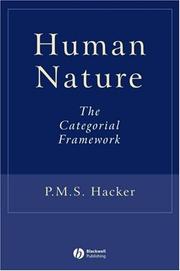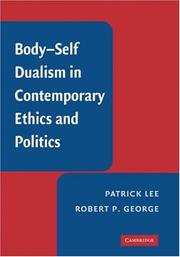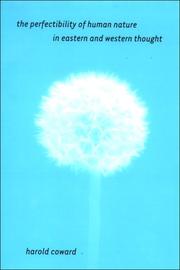| Listing 1 - 10 of 16 | << page >> |
Sort by
|

ISBN: 9781405147286 Year: 2008 Publisher: Malden, Mass. Blackwell
Abstract | Keywords | Export | Availability | Bookmark
 Loading...
Loading...Choose an application
- Reference Manager
- EndNote
- RefWorks (Direct export to RefWorks)
Philosophical anthropology --- Anthropology, Philosophical --- Man (Philosophy) --- Civilization --- Life --- Ontology --- Humanism --- Persons --- Philosophy of mind --- Philosophy
Book
ISBN: 3110333279 9783110333275 3110333074 9783110333077 9783110333077 3110333074 9783938793787 1306430194 Year: 2008 Publisher: Frankfurt : Ontos Verlag,
Abstract | Keywords | Export | Availability | Bookmark
 Loading...
Loading...Choose an application
- Reference Manager
- EndNote
- RefWorks (Direct export to RefWorks)
Freedom, value, power, justice, government, legitimacy are major themes of the present inquiry. It explores the ontological structure of human beings associating with one another, the basic phenomenon of society. We human beings strive to become who we are in an ongoing power interplay with each other. Thinkers called as witnesses include Plato, Aristotle, Anaximander, Protagoras, Hobbes, Locke, Adam Smith, Hegel, Marx, Schopenhauer, Heidegger, Schumpeter, Hayek, Schmitt, Ernst Jünger, et al.
Philosophical anthropology. --- Political science --- Political philosophy --- Anthropology, Philosophical --- Man (Philosophy) --- Civilization --- Life --- Ontology --- Humanism --- Persons --- Philosophy of mind --- Philosophy. --- Philosophy --- Metaphysics --- Political philosophy. Social philosophy --- Philosophical anthropology

ISBN: 9780521882484 0521882486 9780511509643 9780521124195 9780511367786 0511367783 0511366574 9780511366574 0511367198 9780511367199 1107185319 1281146412 9786611146412 1139133470 0511509642 0511365942 0521124190 9781107185319 9781281146410 6611146415 9781139133470 9780511365942 Year: 2008 Publisher: Cambridge ; New York : Cambridge University Press,
Abstract | Keywords | Export | Availability | Bookmark
 Loading...
Loading...Choose an application
- Reference Manager
- EndNote
- RefWorks (Direct export to RefWorks)
Profoundly important ethical and political controversies turn on the question of whether biological life is an essential aspect of a human person, or only an extrinsic instrument. Lee and George argue that human beings are physical, animal organisms - albeit essentially rational and free - and examine the implications of this understanding of human beings for some of the most controversial issues in contemporary ethics and politics. The authors argue that human beings are animal organisms and that their personal identity across time consists in the persistence of the animal organisms they are; they also argue that human beings are essentially rational and free and that there is a radical difference between human beings and other animals; criticize hedonism and hedonistic drug-taking; present detailed defenses of the prolife positions on abortion and euthanasia; and defend the traditional moral position on marriage and sexual acts.
Ethics. --- Philosophical anthropology. --- Deontology --- Ethics, Primitive --- Ethology --- Moral philosophy --- Morality --- Morals --- Philosophy, Moral --- Science, Moral --- Philosophy --- Values --- Anthropology, Philosophical --- Man (Philosophy) --- Civilization --- Life --- Ontology --- Humanism --- Persons --- Philosophy of mind --- Social Sciences --- Political Science

ISBN: 0791478858 1435632117 9781435632110 9780791473368 0791473368 9780791478851 079147335X 0791473368 9780791473351 9780791478851 Year: 2008 Publisher: Albany : State University of New York Press,
Abstract | Keywords | Export | Availability | Bookmark
 Loading...
Loading...Choose an application
- Reference Manager
- EndNote
- RefWorks (Direct export to RefWorks)
How perfectible is human nature as understood in Eastern and Western philosophy, psychology, and religion? Harold Coward examines some of the very different answers to this question. He poses that in Western thought, including philosophy, psychology, Judaism, Christianity, and Islam, human nature is often understood as finite, flawed, and not perfectible—in religion requiring God's grace and the afterlife to reach the goal. By contrast, Eastern thought arising in India frequently sees human nature to be perfectible and presumes that we will be reborn until we realize the goal—the various yoga psychologies, philosophies, and religions of Hinduism and Buddhism being the paths by which one may perfect oneself and realize release from rebirth. Coward uses the striking differences in the assessment of how perfectible human nature is as the comparative focus for this book.
Philosophical anthropology. --- Perfection --- Perfection. --- Anthropology, Philosophical --- Man (Philosophy) --- Civilization --- Life --- Ontology --- Humanism --- Persons --- Philosophy of mind --- Holiness --- Righteousness --- Sanctification --- Flawlessness --- Perfection (Philosophy) --- Perfectionism (Philosophy) --- Virtuosity --- Wholeness --- Mysticism --- Philosophy --- Excellence --- Imperfection --- Religious aspects. --- Perfection - Religious aspects.
Book
ISBN: 9780979405723 0979405726 Year: 2008 Publisher: Chicago, Ill. Prickly Paradigm
Abstract | Keywords | Export | Availability | Bookmark
 Loading...
Loading...Choose an application
- Reference Manager
- EndNote
- RefWorks (Direct export to RefWorks)
Reflecting the decline in college courses on Western Civilization, Marshall Sahlins aims to accelerate the trend by reducing "Western Civ" to about two hours. He cites Nietzsche to the effect that deep issues are like cold baths; one should get into and out of them as quickly as possible. The deep issue here is the ancient Western specter of a presocial and antisocial human nature: a supposedly innate self-interest that is represented in our native folklore as the basis or nemesis of cultural order. Yet these Western notions of nature and culture ignore the one truly universal character of human sociality: namely, symbolically constructed kinship relations. Kinsmen are members of one another: they live each other's lives and die each other's deaths. But where the existence of the other is thus incorporated in the being of the self, neither interest, nor agency or even experience is an individual fact, let alone an egoistic disposition. -- Description from http://www.press.uchicago.edu (Oct. 24, 2011).
Philosophical anthropology --- Philosophy and psychology of culture --- Civilization, Western --- Kinship --- Ethnology --- Clans --- Consanguinity --- Families --- Kin recognition --- Civilization, Occidental --- Occidental civilization --- Western civilization --- Anthropology, Philosophical --- Man (Philosophy) --- Civilization --- Life --- Ontology --- Humanism --- Persons --- Philosophy of mind --- Philosophy --- #SBIB:1H30 --- #SBIB:39A3 --- Filosofie van de mens, wijsgerige antropologie --- Antropologie: geschiedenis, theorie, wetenschap (incl. grondleggers van de antropologie als wetenschap)
Book
ISBN: 9782130561156 2130561152 Year: 2008 Publisher: Paris: PUF,
Abstract | Keywords | Export | Availability | Bookmark
 Loading...
Loading...Choose an application
- Reference Manager
- EndNote
- RefWorks (Direct export to RefWorks)
En 2007, deux ans après le décès de Paul Ricoeur, son livre inachevé Vivant jusqu'à la mort fut publié. Ces derniers fragments viennent clore une œuvre extrêmement riche. Sous une apparente hétérogénéité, un fil conducteur se fait jour. De Soi-même comme un autre jusqu'au traité Sur la traduction, le thème de la capacité et la philosophie de l'action prennent le pas sur la faillibilité. Des philosophes de renom nous présentent de façon inédite cette thématique de l'homme capable, un être agissant et souffrant. Leurs études abordent sous des angles variés la question du soi éthique et de son rapport à l'autre, du soi politique et de l'identité collective, du soi herméneutique et du soi langagier, un être capable de dépasser les ruptures entre les langues et les cultures. En soulignant différents degrés de capacités, ils nous montrent l'originalité de la pensée de Ricoeur en dialogue avec l'histoire de la philosophie et ils poursuivent son questionnement.
Ricoeur, Paul --- Philosophical anthropology. --- Anthropologie philosophique --- Criticism and interpretation. --- Ricoeur, Paul, --- Philosophical anthropology --- Ricœur, Paul --- Ricœur, Paul, --- Anthropology, Philosophical --- Man (Philosophy) --- Civilization --- Life --- Ontology --- Humanism --- Persons --- Philosophy of mind --- Philosophy --- Ricœur, Paul. --- Ricœur, P. --- Lü-ko-erh --- Li-kʻo, Pao-lo --- ريكور، بول --- ريكور، پول --- Рикёр, Поль --- Rikër, Polʹ --- Ricœur, Jean Paul Gustave --- Ricœur, Paul, - 1913-2005 --- Ricoeur, Paul, 1913-2005
Book
ISBN: 9791036504211 2760625141 2760620603 9782760620605 Year: 2008 Publisher: Montréal: PU Montréal,
Abstract | Keywords | Export | Availability | Bookmark
 Loading...
Loading...Choose an application
- Reference Manager
- EndNote
- RefWorks (Direct export to RefWorks)
La modernité a bouleversé la question de la place et du sens de l'être humain dans l'univers. Cette interrogation, certes d'abord philosophique, s'est renouvelée au gré des vagues de découvertes scientifiques. Comme celles-ci n'ont fait que se multiplier à une vitesse grandissante, elles laissent nombre de personnes impuissantes à comprendre l'univers. Qu'est-ce que la vérité ? La foi religieuse n'est-elle plus qu'une option naïve après les révolutions en sciences physiques et, plus récemment, l'extraordinaire percée des neurosciences ? Y a-t-il toujours une place pour la transcendance ? Des spécialistes de réputation internationale confrontent ici leurs points de vue en un dialogue passionné. Œuvrant dans les domaines des sciences pures et humaines (physique, philosophie, théologie, neurobiologie, bioéthique, microbiologie...), ces penseurs, à partir de leur perspective propre, entrecroisent des réflexions qui éclaireront le lecteur sur la question la plus fondamentale de la pensée, celle du sens de l'être humain.
Philosophical anthropology. --- Philosophy and science. --- Religion and science. --- Christianity and science --- Geology --- Geology and religion --- Science --- Science and religion --- Science and philosophy --- Anthropology, Philosophical --- Man (Philosophy) --- Civilization --- Life --- Ontology --- Humanism --- Persons --- Philosophy of mind --- Religious aspects --- Philosophy --- Anthropologie philosophique. --- Philosophie et sciences. --- Religion et sciences. --- Vie --- Life. --- Philosophie. --- philosophie --- science --- anthropologie philosophique --- religion --- 215 --- Godsdienst en wetenschap
Book
ISBN: 0674030907 9780674030909 0674268911 067426892X Year: 2008 Publisher: Cambridge, Mass. Harvard University Press
Abstract | Keywords | Export | Availability | Bookmark
 Loading...
Loading...Choose an application
- Reference Manager
- EndNote
- RefWorks (Direct export to RefWorks)
Character --- Knowledge, Theory of --- Philosophical anthropology --- Reason --- Skepticism --- Scepticism --- Unbelief --- Agnosticism --- Belief and doubt --- Free thought --- Mind --- Intellect --- Rationalism --- Anthropology, Philosophical --- Man (Philosophy) --- Civilization --- Life --- Ontology --- Humanism --- Persons --- Philosophy of mind --- Epistemology --- Theory of knowledge --- Philosophy --- Psychology --- Ethology --- Ethics --- Personality --- Hume, David --- Hume, David,
Multi
ISBN: 9780521717663 9780521888912 9780511812804 0511398077 9780511398070 9780511397301 0511397305 0511812809 9780511400988 0511400985 0521888913 0521717663 110718746X 1316099709 1281383856 9786611383855 0511396570 0511398905 Year: 2008 Publisher: Cambridge ; New York : Cambridge University Press,
Abstract | Keywords | Export | Availability | Bookmark
 Loading...
Loading...Choose an application
- Reference Manager
- EndNote
- RefWorks (Direct export to RefWorks)
In this book, Robert Sokolowski argues that being a person means to be involved with truth. He shows that human reason is established by syntactic composition in language, pictures, and actions and that we understand things when they are presented to us through syntax. Sokolowski highlights the role of the spoken word in human reason and examines the bodily and neurological basis for human experience. Drawing on Husserl and Aristotle, as well as Aquinas and Henry James, Sokolowski here employs phenomenology in a highly original way in order to clarify what we are as human agents.
Human beings --- Phenomenology --- Philosophical anthropology --- Anthropology, Philosophical --- Man (Philosophy) --- Civilization --- Life --- Ontology --- Humanism --- Persons --- Philosophy of mind --- Philosophy, Modern --- Homo sapiens --- Human race --- Humanity (Human beings) --- Humankind --- Humans --- Man --- Mankind --- People --- Hominids --- Philosophy --- Theory of knowledge --- Human beings. --- Philosophical anthropology. --- Phenomenology. --- Arts and Humanities
Book
ISBN: 1435674669 9781435674660 0791477762 Year: 2008 Publisher: Albany, New York : State University of New York Press,
Abstract | Keywords | Export | Availability | Bookmark
 Loading...
Loading...Choose an application
- Reference Manager
- EndNote
- RefWorks (Direct export to RefWorks)
In the twenty-first century, the boundaries between both humans and machines and humans and animals are hotly contested and debated. In Humans, Animals, Machines, Glen A. Mazis examines the increasingly blurring boundaries among the three and argues that despite their violating collisions, there are ways for the three realms to work together for mutual thriving. Examining Merleau-Ponty, Heidegger, and Haraway; artificial intelligence that includes "MIT Embodied AI"; newer holistic brain research; animal studies; the attachment theory of psychologist Daniel Siegel; literary examples; aesthetic theory; technology research; contemporary theology; physics; poetry; machine art; Taoism; and firsthand accounts of cyborg experience, the book reconsiders and dares to propose a new type of ethics and ecospirituality that would do justice to the overlapping relationships among humans, animals, and machines.
Philosophical anthropology. --- Animals (Philosophy) --- Machinery. --- Technology --- Philosophical anthropology --- Machinery --- Philosophy --- Philosophy & Religion --- Speculative Philosophy --- Applied science --- Arts, Useful --- Science, Applied --- Useful arts --- Science --- Industrial arts --- Material culture --- Machines --- Manufactures --- Power (Mechanics) --- Mechanical engineering --- Motors --- Power transmission --- Anthropology, Philosophical --- Man (Philosophy) --- Civilization --- Life --- Ontology --- Humanism --- Persons --- Philosophy of mind --- Technology and civilization --- Philosophy. --- Curious devices
| Listing 1 - 10 of 16 | << page >> |
Sort by
|

 Search
Search Feedback
Feedback About UniCat
About UniCat  Help
Help News
News